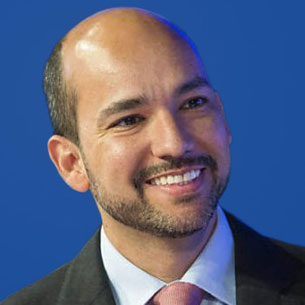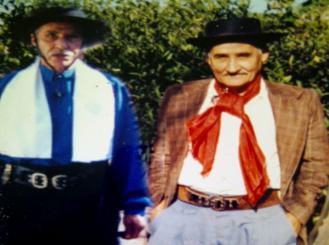I often start my talks on global oncology by showing a picture of my grandfather, Moses, and his younger brother, Fabio, dressed in the garb of the South American cowboy: the gaucho. They are the personification of the demographic transition that took place in their country and the world. It was their generation that left the countryside in the 20th century and came to the cities. There they labored as they could, doing odd jobs, factory work, and construction to ensure that their children, and especially their children’s children, could have access to education and opportunities to become physicians, engineers, entrepreneurs, and more (there are even soccer players in my family—I am Brazilian after all).
Unfortunately, my great-uncle did not live to see his two granddaughters graduate from law school a few years ago. Fabio Lopes developed chronic myelogenous leukemia at a time when imatinib was already the standard treatment for the disease, but the drug was not available in the Brazilian public health system. After a short fight with his leukemia, he died. My grandfather, on the other hand, served in the Brazilian army during World War II, and, because of that, he had access to a different health care system, similar to the one run by the U.S. Department of Veterans Affairs. When Moses Lopes developed cancer, he was able to have a surgical procedure and adjuvant treatment, and in 2014, the family celebrated his 90th birthday with more than 100 family members and his older sister present.
When we talk about global oncology, this is what we want to address. When even two brothers who grew up together in the same rural region and migrated to the same city can have such different results based on their ability to receive adequate care, we clearly have much work to do to improve cancer care in limited-resource settings.
Defining Global Oncology
A working definition of the emerging discipline of global oncology describes it a bit more broadly as addressing biologic differences and disparities in cancer prevention, care, research, education, and the disease’s social and human impact around the world.
Practitioners and researchers in the field are called upon to evaluate and develop strategies to diminish the cancer burden through the promotion of cancer awareness, public and professional education, implementation research, primary prevention, early detection with prompt and accurate diagnosis, multidisciplinary treatment, and palliative care, all in the most efficient manner, spending as little as possible.
As such, a journal that aims to be the voice of global oncology has to attract, review, and publish work relating not only to differences in cancer biology resulting from risk factors, pathogenesis, and pharmacology, but also disparities arising from social, cultural, economic, and political resource-constraining issues.
As someone who has made a career in global oncology, with experiences in clinical and health services, policy, and outcomes research in low- and high-resource settings in Asia, Latin America, and the United States, and as a founding associate editor of the Journal of Global Oncology (JGO), I believed I had the right motivation, skill set, and network of colleagues and collaborators to serve as the editor in chief of JGO. I also wanted to help ASCO and our international membership make it into the most important journal on the subject. I was humbled and ecstatic—and even a little surprised when one thinks of the many qualified and more experienced colleagues who could also fill these shoes—that the search committee and the board of directors selected me to succeed David Kerr, MD, PhD.
JGO: Year One and Two
JGO had a very successful start under Dr. Kerr’s leadership. Since we began accepting submissions in May 2015, we received approximately 800 manuscripts, of which a little fewer than half have been original reports. Case reports, commentaries, and special articles comprise the remainder. We have also published abstracts from conferences such as the 4th Annual Symposium on Global Cancer Research, co-hosted by the National Cancer Institute Center for Global Health.
We have reviewed or published studies ranging from top-heavy information (such as cancer incidence, prevalence, and secular changes found in registries) to local issues (implementation research) in the form of clinical trials that address country- or region-specific issues. Moreover, contributions in innovation and collaboration (North-South, East-West, and South-South) are welcome.
We have kept the journal open access, with the current time for rejection without review set at approximately 1 week and the average time to publication online set at approximately 2 months. Authors have hailed from more than 30 countries, most commonly the United States, Brazil, India, China, Japan, South Africa, Kenya, and Nigeria, but they are also from Egypt, Malawi, Lebanon, Tanzania, and many others. Articles published in JGO were searchable through Google Scholar from the beginning and were included in PubMed searches in 2017. We expect full PubMed status in the next few months and our first impact factor in the near future.
New Goals
Although these numbers are encouraging for a new journal, we would like to increase the number of submissions by working with ASCO membership (our organizational partner), the Union for International Cancer Control, and other sister organizations and editorial boards to improve the breadth of countries represented, especially in Africa and East and Southeast Asia.
We would also like to see more submissions on implementation science, the development of registries in limited-resource settings, health economics, and policy research geared toward low- and middle-resource countries. We will be the official outlet for ASCO’s resource-stratified guidelines, authoritative manuscripts that should guide regions, countries, and health care systems in improving their current situations in a step-by-step manner starting with the most efficient and important interventions.
As we evaluate potential innovations for JGO such as awarding continuing medical education points to reviewers, prioritizing articles based on specific criteria and potential impact, and searching for further support to decrease or eliminate author manuscript fees, we would love to hear from you. Please email us at jgo@asco.org with your suggestions, comments, and also complaints. This is our journal and our voice for global oncology.
Originally published in 2017 ASCO Daily News; updated and reprinted with permission.



Recent posts